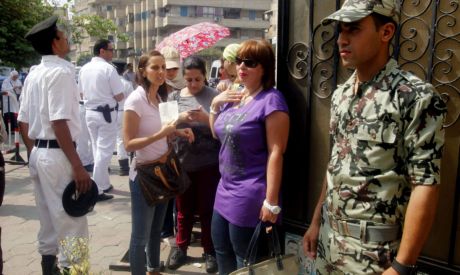 "Why should I vote? My vote doesn't count and the picture is very clear – they want (Ahmed) Shafiq and they are going to make him the next president whoever we vote for," said Hussein, a Cairo taxi driver.
"Why should I vote? My vote doesn't count and the picture is very clear – they want (Ahmed) Shafiq and they are going to make him the next president whoever we vote for," said Hussein, a Cairo taxi driver.
For Hussein "they" are the ruling Supreme Council of the Armed Forces (SCAF), and his words reflect the cynicism of many Egyptians about the presidential election runoff, which comes just days after parliament was dissolved and a law barring former regime figures from standing for political office was struck down.
At the age of 63, this retired civil servant who turned to driving taxis because his pension was "good for nothing," voted for the Nasserist Hamdeen Sabbahi in the presidential election first round.
"At the time I thought we were having real elections but now I know it's a soap opera; just like the Ramadan TV series," Hussein said.
He said he thought other candidates had a better chance than Sabbahi of making it to the runoff, such as Amr Moussa, Abdel-Moneim Abul-Fotouh and Mohamed Mursi, but when he saw Shafiq had made it to the runoff with Mursi, he said, "now it is clear, they want Shafiq and they are forcing people to choose between him and the Brotherhood so that he can win."
"I have no interest in either candidate and I'd rather spend the day working instead of queuing up at the polling station to waste my vote," Hussein concluded.
In many areas of Cairo, the polling stations were much quieter than during polling in the first round on 23-24 May.
"There is no point taking a day off to vote when I know in advance that Shafiq is going to win and when I know I cannot vote for him, or for Mursi, for that matter," said Sara, a sales assistant at one of Cairo's upscale shopping malls.
Sara said she could "never vote for Shafiq because if we vote for Shafiq, why did we have the revolution in the first place?"
Shafiq was appointed prime minister by Hosni Mubarak during the first week of the revolution and was removed less than a month after he was toppled.
Sara said she could not vote for the Brotherhood's candidate Mohamed Mursi out of fear that "he would change Egypt in every way."
She said she was particularly concerned he would deny women the right to work.
There were, however, people voting out of conviction, and not merely for the "lesser evil", as many voters appear to have done.
"Of course I voted for Shafiq – who else," said Nadine, an employee at a PR company. "There is no way that I would have voted for Mursi. The Muslim Brotherhood is out of the question," she insisted.
As far as Nadine was concerned, Shafiq might not be compatible with the goals of the revolution but she was against the revolution from the start and said it was an act of "foreign intervention in Egypt's affairs."
Shafiq is the right man "to restore the situation," she added.
Dalia, who did not go to Tahrir Square during the 18 days of the revolution, said, "I chose to vote for Mursi because I believe that change is exactly what this country needs."
However, Dalia said she was sure Shafiq was going to be the elected president: "They (the SCAF) have done everything to show that they are backing him, but I said to myself I would do what I have to do so I can feel at peace with myself."
Dalia is "convinced" the SCAF is restructuring the Mubarak regime piece by piece.
"Yes they are; the SCAF dissolved the freely-elected parliament and they pushed Shafiq into the second round when we all knew that his nomination was a joke in the first place," Dalia said. "Let's face it, the revolution is over; Shafiq is coming anyway."



